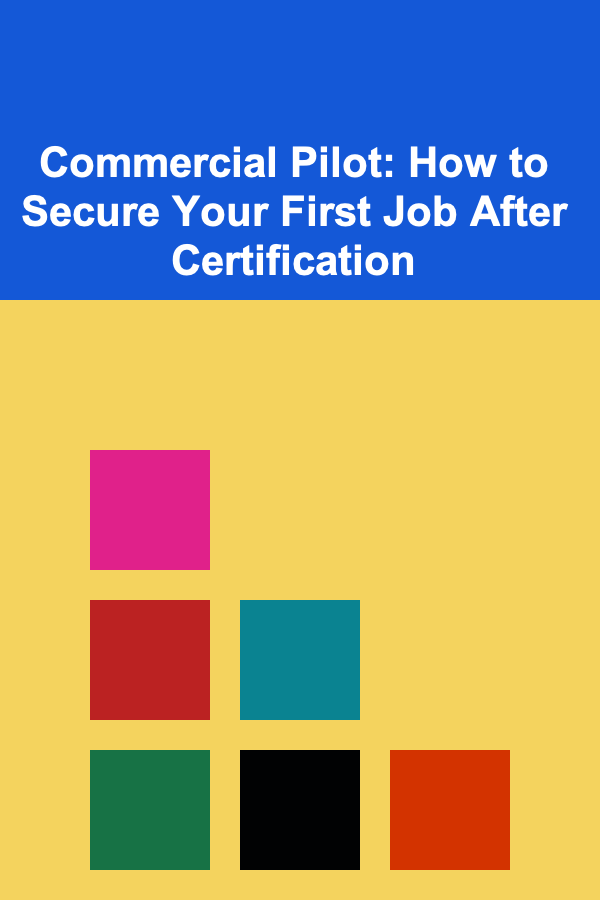
Commercial Pilot: How to Secure Your First Job After Certification
ebook include PDF & Audio bundle (Micro Guide)
$12.99$5.99
Limited Time Offer! Order within the next:

Becoming a commercial pilot is a monumental achievement. After years of rigorous training, extensive flight hours, and passing challenging exams, the moment arrives when you hold your commercial pilot license (CPL) in your hand. The next crucial step in your aviation career is securing your first job as a commercial pilot. However, this phase can often feel overwhelming, given the competitiveness and high standards of the aviation industry.
This article will provide a comprehensive guide on how to secure your first job as a commercial pilot, discussing the strategies and actions necessary to position yourself effectively for job opportunities, how to network, and how to handle the challenges you may face in the process.
Understanding the Commercial Pilot Job Market
Before diving into job search strategies, it's essential to first understand the current state of the commercial aviation job market. The aviation industry is dynamic, and several factors can affect job opportunities for newly certified pilots. This includes:
Industry Demand
The demand for commercial pilots tends to fluctuate based on global economic conditions, fuel prices, technological advancements, and airline passenger traffic. In recent years, many countries have faced a pilot shortage, largely due to the aging workforce of airline pilots and the high cost of training. This shortage has created numerous opportunities for qualified pilots to enter the industry.
Airline vs. Charter vs. Cargo
The first job you take as a commercial pilot may not be with a major airline. In fact, many pilots begin their careers with smaller charter companies, flight schools, or even cargo operations. These roles can provide valuable flight hours and experience, which are essential for advancing in the aviation career ladder.
Experience Requirements
While entry-level jobs are available, the competition is fierce. Many employers will require specific flight hours, such as 1,500 hours for airline jobs (for a Commercial Pilot License with an Airline Transport Pilot Certificate). Entry-level jobs may accept fewer flight hours, but they often involve working for lower pay with fewer benefits.
Preparing Yourself for the Job Search
2.1 Build a Strong Resume and Cover Letter
Your resume and cover letter are your first opportunity to impress potential employers. They should not only reflect your technical qualifications but also highlight your professionalism and passion for aviation.
Resume Tips:
- Qualifications and Certifications: Clearly list your CPL, flight hours, type ratings, and any other relevant certifications.
- Flight Experience: Emphasize your flying hours, any special flying conditions you have encountered (e.g., cross-country, night flying, high altitude), and any specific aircraft you have flown.
- Skills: Highlight skills that make you a well-rounded pilot, such as decision-making, communication, leadership, and crisis management.
- Professional Experience: If you have worked in aviation in a different capacity (e.g., flight instructor), include this experience to demonstrate your versatility.
- Personal Traits: Many employers value personal attributes like work ethic, enthusiasm, and adaptability. Include any relevant volunteer or extracurricular activities that demonstrate these qualities.
Cover Letter Tips:
Your cover letter should complement your resume by showing a personal touch. It should demonstrate why you are passionate about flying and why you want to work for that particular company. Personalize the letter for each application.
2.2 Continue Building Flight Hours
The more flight hours you log, the more attractive you become to employers. There are a few ways to continue building flight hours after receiving your CPL:
- Flight Instructor: Becoming a certified flight instructor (CFI) is one of the most common pathways for building flight hours. You can earn money while teaching others to fly and continue accumulating experience in various flight conditions.
- Banner Towing or Aerial Surveying: These are entry-level flying jobs that allow you to rack up hours, though they tend to be low-paying and can be physically demanding.
- Freelance Pilot Work: As a freelance pilot, you may fly for private clients, agricultural businesses, or small charter companies, providing you with varied experience.
2.3 Focus on Specialized Certifications
Additional ratings and endorsements can make you a more competitive candidate for certain types of commercial pilot jobs. Some of the most beneficial certifications include:
- Type Ratings: If you are targeting a specific aircraft, obtaining a type rating can make you stand out.
- Instrument Rating: An instrument rating is necessary for flying in low visibility and can significantly expand your job prospects.
- Multi-Engine Rating: This rating will allow you to fly more complex aircraft, which may be required for many commercial pilot positions.
Networking and Building Industry Relationships
Networking is an essential part of securing your first job as a commercial pilot. Like many industries, aviation thrives on personal connections and word-of-mouth recommendations. Here's how to network effectively:
3.1 Join Aviation Organizations
Several organizations and associations cater to aviation professionals. Joining these groups can help you meet other pilots and aviation industry experts, as well as gain access to exclusive job listings.
- AOPA (Aircraft Owners and Pilots Association): Offers resources for pilots and job opportunities.
- ALPA (Air Line Pilots Association): The largest pilot union in the United States, offering networking opportunities.
- National Business Aviation Association (NBAA): Ideal for pilots seeking jobs in business aviation or charter services.
- Women in Aviation International (WAI): An inclusive organization that offers networking, mentorship, and job boards.
3.2 Utilize Social Media and Online Platforms
Social media is becoming increasingly important in the professional world, and aviation is no exception. LinkedIn is a particularly valuable tool for pilots, where you can build a professional profile and connect with recruiters, airlines, and other pilots.
Additionally, there are aviation-specific job boards and forums, such as AvJobs and PilotJobSearch, where you can find job postings and advice from fellow pilots.
3.3 Attend Job Fairs and Airshows
Job fairs and aviation-related events (such as airshows) are excellent opportunities to meet employers face-to-face. Many airlines and charter companies attend these events looking for new talent, and you can often submit your resume directly to hiring managers.
3.4 Mentorship and Relationships with Flight Schools
Flight schools are often a great place to build relationships. As a newly certified commercial pilot, staying in touch with your instructors and fellow pilots can help open doors to job opportunities. They may know about job openings or offer personal recommendations that can help you land a job.
Apply Strategically
Applying for jobs as a commercial pilot can be overwhelming due to the number of applications you'll need to send out. To maximize your chances of success, take a strategic approach:
4.1 Research Potential Employers
Before applying, research potential employers thoroughly. Understand their requirements, fleet composition, and company culture. Tailor your application to highlight how your experience and qualifications align with their needs.
4.2 Start Small, Think Big
Your first job as a commercial pilot may not be at a major airline, and that's perfectly fine. Many pilots start with smaller charter services, freight companies, or as flight instructors before moving on to larger operations. These positions will give you the necessary flight experience, and many pilots move from these smaller companies to major airlines after building enough hours and experience.
4.3 Be Prepared for Interviews
When you're called for an interview, preparation is key. You'll likely face both technical questions about aviation and scenario-based questions that test your decision-making and crisis management skills. Practice answering common interview questions and review the company's history and operations so that you can ask insightful questions.
4.4 Demonstrate Your Soft Skills
While technical skills are crucial, commercial pilots must also demonstrate strong soft skills, such as communication, teamwork, and the ability to handle stressful situations. Employers will assess how you interact with others and your ability to maintain a calm demeanor under pressure.
Overcoming Challenges and Staying Persistent
The journey to landing your first job as a commercial pilot can be challenging. Rejection is inevitable, and it's important to stay resilient. If you don't get a response immediately, don't be discouraged. Continue building your hours, improving your skills, and expanding your network. Over time, the right opportunity will present itself.
5.1 Stay Flexible
Flexibility is vital. You may need to relocate to a new city or country to find job opportunities. Being open to different types of commercial flying, whether it's charter flying, cargo, or flight instruction, can help you get your foot in the door and build the hours necessary for more desirable positions.
5.2 Maintain a Positive Attitude
A positive attitude can go a long way in aviation. Employers look for pilots who are proactive, enthusiastic, and dedicated. Show that you are committed to continuing your education, expanding your skills, and contributing positively to the company culture.
Conclusion
Securing your first job as a commercial pilot is undoubtedly challenging, but it is not impossible. By strategically building your flight hours, networking with industry professionals, researching potential employers, and staying persistent, you can improve your chances of landing the job of your dreams. Remember, aviation is a journey, and each step you take brings you closer to your goals.
Keep honing your skills, stay open to opportunities, and, most importantly, keep flying toward your aspirations. The aviation industry is vast, and there is a world of possibilities waiting for you once you've earned your wings.
Reading More From Our Other Websites
- [Personal Finance Management 101] How to Budget and Save Money as a Couple
- [Paragliding Tip 101] Best Beginner's Guide to Paragliding: Mastering the Basics and Finding Your First Launch Site
- [Organization Tip 101] Common Garage Door Opener Problems and How to Fix Them
- [Biking 101] Best Gravel Biking Routes in the Pacific Northwest
- [Organization Tip 101] How to Store Ironing Boards Without Taking Up Space
- [Personal Investment 101] How to Evaluate Investment Opportunities in Cryptocurrencies
- [Digital Decluttering Tip 101] Best Digital Decluttering: Conquer Email Overload & Reclaim Your Inbox Peace
- [Personal Care Tips 101] How to Find the Best Shaving Cream Alternatives for a Smooth Shave
- [Home Family Activity 101] How to Start a Family Scrapbooking Tradition to Capture Memories
- [Personal Care Tips 101] How to Avoid Common Myths About Exfoliating Body Scrubs

How to Invest in Green Energy and Sustainable Companies
Read More
How to Stay Motivated During the Stressful Days Leading Up to the Event
Read More
How to Track Business and Personal Expenses Separately
Read More
Make Money by Automating with Deep Learning Solutions
Read More
10 Tips for Writing Cozy Mystery Subplots
Read More
How to Build a Personal Brand as an SEO Specialist
Read MoreOther Products

How to Invest in Green Energy and Sustainable Companies
Read More
How to Stay Motivated During the Stressful Days Leading Up to the Event
Read More
How to Track Business and Personal Expenses Separately
Read More
Make Money by Automating with Deep Learning Solutions
Read More
10 Tips for Writing Cozy Mystery Subplots
Read More